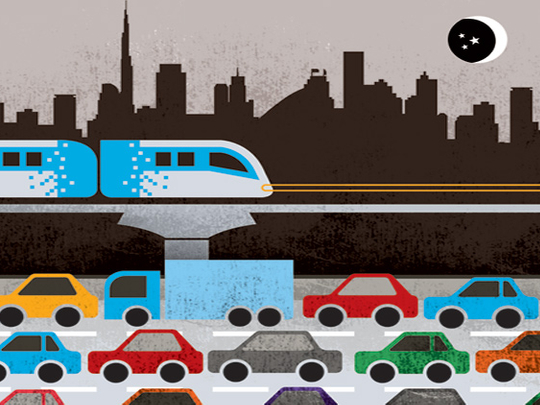
What would it take to make you leave the car at home and take the Dubai Metro to work today or tomorrow? Free Wi-Fi during Ramadan was a great incentive.
Or perhaps the planned road developments, as Dubai goes though the latest wave of growth and evolution, would be enough to change the habit of a lifetime?
Major global cities like Dubai are wrestling with very similar challenges. Dubai has a great advantage in that new urban developments can harness smart solutions as part of the city’s commitment to smart living.
Traffic management, congestion and parking are all major challenges and they are not going away. Cities will play a central role in the world’s future growth, but traffic congestion and energy use could limit their potential. This is where smart cities and intelligent transport systems could help.
According to estimates from the UN, the world’s population will have swelled to 9 billion in 2050, up from the current 7 billion. The bulk of this population growth will happen in cities, reflecting the increasing urbanisation worldwide.
This will see the projected urban population grow to 6.3 billion by 2050, over double today’s total of 2.8 billion. Increased urbanisation will almost inevitably lead to more congestion as people take to cars to find their way around densely populated centres.
This can be a massive drain on productivity — for example, the World Bank claims that congestion already costs Cairo 4 per cent of the city’s GDP. Brussels currently tops the world rankings for traffic congestion, according to the INRIX Traffic Scorecard.
Public transport
One of the solutions to this congestion dilemma is to get people out of their cars and onto public transport. Even in large congested cities, such as Paris, around half of the journeys are still done by car.
Technology can help overcome the reluctance that people have in getting out of their car — one way is by offering Internet access on the public transit system, as Dubai Metro did this Ramadan.
These kinds of incentives work — in Nantes, France, public Wi-Fi access in buses encourages people to get on the bus just to check their e-mail. Travellers on Thales trains in France rate Wi-Fi access as the second most popular benefit after food.
However, cities will still have to look after people who either need to travel in cars or who don’t want to travel on public transport. Effective parking options are essential.
Around 30 per cent of traffic situations in cities are caused by people looking for a parking place, according to Streetline. In some cities it is even higher — it is as high as 40 per cent in Palermo, Italy. On average, people search for 18 minutes to find a spot.
Recent research shows that the average UK motorist spends over 2,500 hours (106 days) in their lifetime driving around looking for car parking spaces; in a built-up city like London, it takes an average of 20 minutes to find a parking space.
There are now systems available that use sensors in the street and infrastructure around the city to detect where parking is available and makes this information available for drivers. This can be combined with public transport to create hubs with parking to get drivers out of their cars. In Washington DC, drivers can see in real time if there is parking available in the train station, which encourages them to use the train to travel downtown.
Smart city projects are among the most exciting technological initiatives around today and will play a major role in the world’s future growth. A nice side benefit of smart infrastructure is that the sensors that have been installed for one application can be also be used for another.
Modern technology lets us track and monitor pretty much anything in a major urban environment — noise, light, traffic, weather and so on — and use this data to improve people’s living and working conditions.
Traffic and parking availability is one area of smart city projects that is leveraging new technology to drive real change. New technology is emerging all the time that lets us manipulate networks more finely, taking advantage of more sensors, more cameras and more real-time data to improve road traffic.
Smart cities already have technology in place to install a ‘mesh’ over the whole urban environment, with sensors installed to transmit real-time traffic data across the network. Sensors placed on buildings and on kerbsides could determine whether or not there is a car parked in a space and communicate this information to smartphone users — it could even bring satellite navigation and mapping technology into the mix to deliver true, real-time parking information to drivers — saving a lot of time and frustration.
— Laurent Marini is Country Manager Saudi Arabia, Orange Business Services, and Managing Director of Orange Business Arabia.











